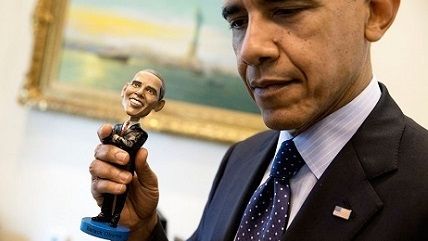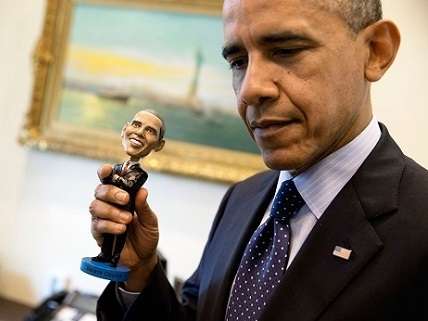5 Obama Administration Accomplishments Libertarians Might Appreciate
From starting efforts on police and occupational reform to helping privatize the space race, here are things we'll miss about Barack Obama.


The Obama administration has been defined by a lot of big, dumb fails, including the 2009 stimulus, Obamacare, and a failure to contain the Islamic State (ISIS). President Obama and the Democrats spent their period of single-party control (2009-2010) successfully pushing a progressive agenda that locked in rising debt levels and led to massive electoral losses in 2010 and beyond. For much of his presidency he was hostile to state experiments in drug legalization, he dragged his feet on marriage equality, and he left a legacy of hundreds of new onerous federal regulations. His administration avoided transparency, politicized numerous issues, and often ignored root policy problems. In foreign policy especially, the Obama administration careened from one disaster to another—the president tried unsuccessfully to postpone the end of the war in Iraq, ordered a troop surge in Afghanistan, and then wasted any opportunity that might have created for a disengagement. He committed the U.S. military to an intervention in Libya for which he did not even attempt to get permission from Congress. Nor did he justify the action under the post-9/11 Authorization for the Use of Military Force (AUMF) that's used to justify interventions from Afghanistan to Nigeria. U.S. troops did return to Libya last year, presumably under the auspices of the post-9/11 AUMF, to fight ISIS, which did not exist in Libya before the U.S.-backed intervention. Troops also returned to Iraq for that reason.
Nevertheless, the Obama administration did accomplish some things that just might hold up from a libertarian perspective. As his administration transitions into the history books, here are five actions that libertarians can appreciate:
1. Police Accountability & Criminal Justice Reform
Since the start of the Obama administration, the Department of Justice (DOJ) started 25 "pattern or practice" investigations into police misconduct at various law enforcement agencies. According to the DOJ, the Civil Rights Division has 19 agreements currently being enforced—14 of those are consent decrees, which are settlements in which police departments agree to reforms without admitting any liability for misconduct uncovered by the DOJ. Such investigations are not new to the Obama administration—the DOJ began to launch them in 1994 under the auspices of that year's crime bill. But the pace of the investigations is new. Between 1994 and 2008 the DOJ entered into 20 reform agreements as a result of a pattern-or-practice investigation. The Clinton administration DOJ opened 5 investigations that resulted in reform agreements, and the Bush administration 10. The Obama DOJ is handing over at least three open investigations (including that of the Orange County Sheriff's Department and District Attorney's Office) to the incoming Trump administration, plus the 19 agreements currently in enforcement.
The increased pace of federal investigations of systemic police misconduct is not the only way the Obama administration has moved the cause of police accountability forward. Obama's "task force on 21st century policing" was purely a reaction to the national attention to protests over police brutality in Ferguson and the response by militarized police, and its report was largely, as Scott Shackford characterized it, a "dream journal," but it was nevertheless an important moment in bringing the issue of police reform into the mainstream political debate.
Obama also has a number of limited accomplishments on criminal justice reform, although ultimately Democrats in Congress torpedoed bipartisan criminal justice reform legislation over their opposition to mens rea reform that would minimize the number of "accidental criminals," just the kind of concept that ultimately saved Hillary Clinton from federal indictment. Nevertheless, Obama is the first U.S. president to leave office with a smaller federal prison population than the one he inherited, has advocated for sentencing reform, and reversed a directive for federal prosecutors to always seek the harshest sentences available. He lays out some of these accomplishments, and a supersized serving of embellishment in an article in the Harvard Law Review. He also shortened more sentences than any of his predecessors in the White House.
2. Immigration Reform
President Obama leaves on balance a poor immigration legacy. He and the Democratic Congress failed to tackle the issue when they had control of the executive and legislative branches. The Obama administration reached a record high for deportations in 2013, and efforts by President Obama and the Republican Congress failed to produce any reform, the legislative effort becoming an exercise in "coming back for more" goodies. Nevertheless, in late 2014 Obama ordered a reprioritization in immigration enforcement that deferred deportation for up to 5 million people, mostly those who came illegally as children, or who had American-born children themselves. It was the first relief for otherwise law-abiding illegal immigrants since limited efforts by the Clinton administration and the Republican Congress in the 1990s.
In his last week, Obama also ended the "wet foot/dry foot" policy for Cuban immigrants, drawing praise from restrictionists and immigration reformers alike. As with many of his actions, the ultimate consequences won't be known until the next administration acts off it—the Cuba move could lead to broader reforms toward permitting more political refugees to enter, from places like Cuba and Venezuela, or it could become the first step in implementing restrictions to reduce the flow of legal immigrants into the U.S.
3. Occupational Licensing Reform
In early 2015, the White House started to signal a possible interest in reducing occupational licensing barriers. "By one estimate, licensing restrictions cost millions of jobs nationwide and raise consumer expenses by over one hundred billion dollars," a Treasury Department report released that summer read. It was an important step in acknowledging what libertarian critics have for years identified as a detrimental government intervention into the economic sphere and an abrogation of basic freedoms. Last year the Obama administration announced $7.5 million in grants to organizations working on reducing occupational licensing requirements and making such licenses usable across state lines.
The Obama administration's embrace of rolling back occupational licensing came concurrently with pushes at the state level and a bipartisan effort in Congress, which means it could still lead to positive reforms that won't be as easily reversible as many of Obama's executive actions.
4. Privatization in Space
President Obama's space policy was, as Katherine Mangu-Ward reports in next month's issue of Reason magazine, "one of his administration's bright spots." Obama cut the pork-laden Bush-era Constellation program, a planned successor to the scrapped space shuttle, and instead supported the Commercial Orbital Transportation Services project, which, as Mangu-Ward notes, costs less than a single shuttle flight. The program encouraged private companies to work toward providing delivery services to the International Space Station, resulting, she writes, in "successful public-private partnerships with Orbital Sciences and Elon Musk's SpaceX. An adjacent effort created Commercial Resupply Services contracts with private companies to deliver cargo to the space station, and later commercial crew vehicles to carry human passengers."
Privatizing space will yield benefits in technological progress at lower costs, which are difficult trends for even the most big government-motivated government to successfully thwart. The Obama era could be the dawn of an era of exciting private enterprise in space.
5. Commutation of Chelsea Manning's Sentence
With four days left in office, President Obama announced that he was commuting the sentence of Private Chelsea Manning, to end in May of this year instead of 2045. Manning was convicted on charges related to her disclosures of government documents including video of U.S. airstrikes on civilians in Iraq and Afghanistan, documents related to the war in Iraq, and nearly a quarter million diplomatic cables from the Department of State. The disclosures revealed a lot about how U.S. foreign policy was conducted, in contrast to how it was presented to Americans and the rest of the world. At the time of Manning's exposure as the source of the leaks, Obama said it was clear the private "broke the law."
Edward Snowden, the former NSA contractor whose disclosures to Glenn Greenwald blew the whistle on the U.S. government's massive surveillance efforts at home and abroad, urged President Obama to grant Manning clemency, and Julian Assange, the founder of Wikileaks, offered to surrender himself to U.S. authorities (provided his rights are guaranteed) if Obama granted Manning clemency. The president said Assange's comments played no role in his decision.
The commutation does, however, complicate the Democratic narrative about Wikileaks (which also helped Snowden find sanctuary in Russia) as a Russian patsy for releasing emails from the Democratic National Committee and the account of Hillary Clinton campaign chair John Podesta, which, like the Manning disclosures, offered Americans an inside look at how their leaders operate. For his part, Obama said the Manning commutation "made sense" to him. "Chelsea Manning has served a tough prison sentence," Obama said, at his last press conference as president. "It made sense to commute, and not pardon her sentence… I feel very comfortable that justice has been served, and a message has still been sent."


Show Comments (257)